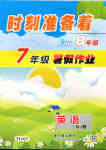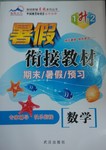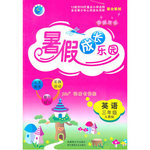题目内容
---He’s stopped from smoking , ________he?
---Yes, he ________ stopped smoking.
- A.hasn’t , is
- B.isn’t , is
- C.isn’t , has
- D.has, is
前句中的’s是is的缩写,表示被动意义;后句中表示的是完成时态,故用has。

 时刻准备着暑假作业原子能出版社系列答案
时刻准备着暑假作业原子能出版社系列答案 暑假衔接教材期末暑假预习武汉出版社系列答案
暑假衔接教材期末暑假预习武汉出版社系列答案 假期作业暑假成长乐园新疆青少年出版社系列答案
假期作业暑假成长乐园新疆青少年出版社系列答案
|
broadcast1/'brɔ:dkɑ:st||ˈbrɔdˌkæst/n[C] a programme on the radio or on television: a radio news broadcast | live broadcast ( = a programme that you see or hear at the same time as the events are happening) broadcast2 v past tense and past participle, broadcast 1 [ I,T] to send out radio or television programmes: The interview was broadcast live across Europe. 2 [T] to tell something to a lot of people: There was no need to broadcast the fact that he lost his job. broadcaster /ˈbrɔːdkɑːstə || ˈbrɔːdkæstər/ n [C] |
curious/ ˈkjʊəriəs || 'kjur-/ adj 1 wanting to know about something: When I mentioned her name everyone was curious. | [ +about] I’m incurious about this book she's supposed to be writing. |curious to see/hear/know etc: Mandy was curious to hear what Peter had to say himself.—opposite INCURIOUS 2 strange or unusual: a curious noise coming from the cellar | curious that It's very curious that she left without saying goodbye. curl1 /kɜ:l|| kɚrl/ n 1[C] a small mass of hair |
|
flask / flɑ:sk || flæsk/n [C] I BrE a special type of bottle that you use to keep liquids either hot or cold, for example when travelling 2 a flat bottle usually used to carry alcohol 3 a glass bottle with a narrow top, used in a LABORATORY flat1/ flæt / adj flatter, flattest 1▶ SURFACE◀ smooth and level, without raised or hollow areas, and not sloping or curving: a flat-bottomed boat |a perfectly flat sandy beach | flat as a |
pollute / pə'lu:t/ v [T] 1 to make air, water, soil etc dangerously dirty and not suitable for people to use: beaches polluted by raw sewage | industrial emissions that pollute the air 2 pollute sb’s mind to give someone immoral thoughts and spoil their character: fears that Lawrence's novels would pollute young minds--polluted adj: polluted rivers--polluter n [C] pollution / pəˈlu:ʃn /n [U] 1 the process of making |
1.The pronunciation of the word "broadcast" is ____ or/ˈbrɔdˌkæst /.
A. /'brɔ:dkɑ:st/ B. /'brəud'sɑ:st/ C. /bræd'kɔst/ D. /'bru:dkɑ:st/
2.The word"____ "can be used as an adjective (形容词).
A. pollute B. pollution C. curious D. curiously
3.Which of the following is a flask?




A. B. C. D.
4. The word "pollute" means "______".
A. to tell something to a lot of people B. wanting to know about something
C. a programme on the radio or on TV D. to make air. water, soil, etc dirty
5.These texts are probably from ______.
A. a magazine B. a dictionary
C. a newspaper D. an advertisement
请仔细阅读第56—60题中Mike, Linda, Tom, Judy和Mr. Chen的个人情况说明,从A到F的六个选项中,选出符合各人要求的最佳选项,其中一项为多余选项。
56. Mike is fond of music. Sometimes he goes to the concert.
57. Father’s Day is coming. Linda wants to invite her father to dinner.
58. Tom is a sports fan. He often watches ball games with his classmates.
59. Judy will graduate from a college next month. She’s looking for a job.
60. Mr. Chen is a kind—hearted man. He’s always ready to help others.
| A |
| The Chinese Red Cross Honestly invites financial aid from worldwide to support people in the earthquake-hit area. Online donations: Red Cross Society of China website www. redcross. org.cn |
| B |
| The Same Song Come to Fuzhou Want to spend a wonderful evening? Want to enjoy exciting hip hop? Want to see your favorite pop singer? Come on! Place: Sports Center Time: 7:30 p.m. Sep. 16 Ticket: ¥ 50 |
| C |
| Tour Guide Wanted Age between 20-30 Good health Two foreign languages Apply to: Red Rose Travel Agency Tel: 0571-82665588 |
| D |
| A Basketball Game Class One VS Class Six Place: School Playground Time: 3:50 p.m. this Friday Please come and watch it |
| E |
| Sunny Seafood Restaurant Fresh Tasty Reasonable price Add: 386 Renmin Road Tel: 0571-82666888 |
| F |
| Farnham Dance New ballet(芭蕾) classes at the St. John’s Centre, 19 Tilford Rd, Farnham GU9 8DJ. Tuesday afternoons, 10 week terms Call 0571-82727347 |
B. Paul
C. Paula's classmate
D. Not A, B or C
B. nine students
C. eight students
D. eight girls
B. in a hotel
C. with her classmates
D. at Mr. Brown's home
B. Thomas.
C. Andrew.
D. Catherine.
B. 12.
C. 7.
D. 9.
 _____.
_____.
 Nathan Sawaya's childhood was a lot of fun. He drew cartoons, wrote stories, and played with plastic toy bricks (积木). His grandparents bought his first set of toy bricks when he was five years old and he's been building with toy bricks ever since. He even took his building bricks to college with him! Instead of books and a computer, he had a model of Greenwich Village made of bricks on his desk.
Nathan Sawaya's childhood was a lot of fun. He drew cartoons, wrote stories, and played with plastic toy bricks (积木). His grandparents bought his first set of toy bricks when he was five years old and he's been building with toy bricks ever since. He even took his building bricks to college with him! Instead of books and a computer, he had a model of Greenwich Village made of bricks on his desk.